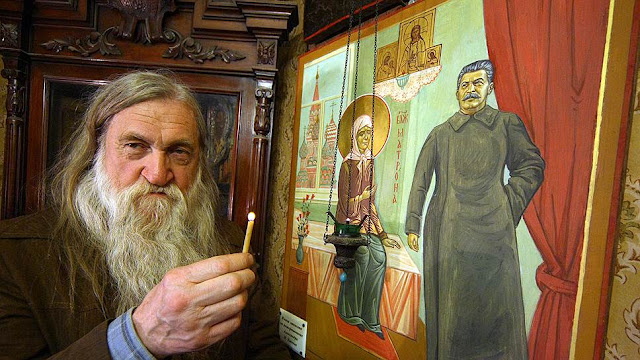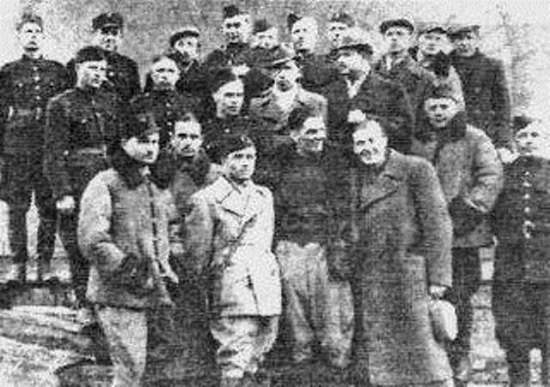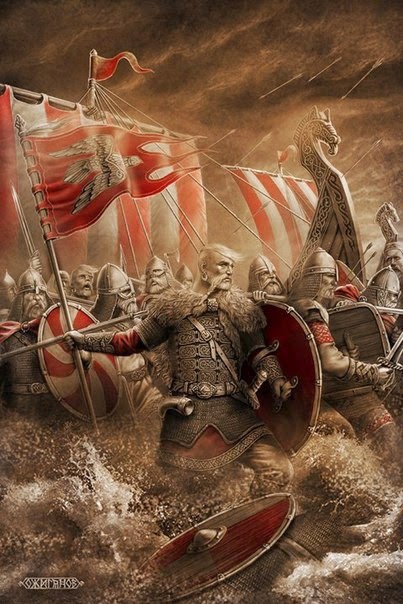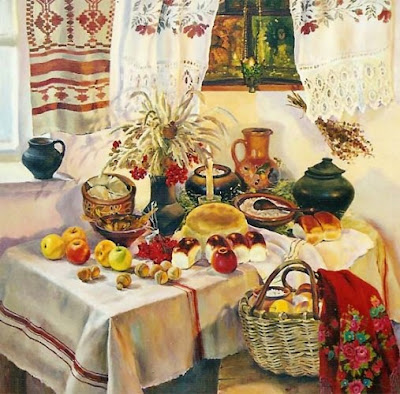THE MOSCOW PATRIARCHATE CHURCH IN UKRAINE - CONSEQUENCES OF CENTURIES OF OCCUPATION
Since Cossack times Moscow has been using wide spectre of measures in order to suppress Ukraine's statehood. Alas, it was the religious factor that numerously played a key role in these attempts. One of the most eloquent examples took place in 1775, when Empress Katherine II had decided to destroy the Zaporizhian Sich. The Cossack stronghold had been surrounded by Moscowy forces, but Moscow-guided priests were the ones, who played a "battering ram" role in that battle persuading the cossacks to not spill a Christian blood and lay down arms. After the Sich gates were open, the "brothers in faith" slayed almost everyone inside.
In general, first attempts of Ukrainian Orthodoxy to establish own independent unified methropoly were dated 1448. At the end of the XV century Moscow Empire proclaimed proclaimed itself the successor to the Byzantine Empire. However, the development of a new Christian empire had deviated from the fundamentals of universal theocratic ideology, and was increasingly based on Russian chauvinist and secular principles. But Christianity can not be solely the property of Greek or Moscow culture, it is universal. Therefore, in the process of a multinational empires building a Church involuntarily begins to serve narrow interests of a ruling nation, that is, the assimilation of other folks of the empire. And this is already an obvious distortion of a Church's essential mission. According to Peter the Great, when the patriarchal leadership was abolished and the synod was formed, headed by a state official, the conquest of the Church to the interests of the state became even more evident.
After the USSR collapse Ukrainian Orthodoxy finally obtained a chance to establish own, independent from Moscow political course Church. Alas, inner intrigues, fueled by external agentures influence, the Ukrainian Orthodox Church had devided to the Kyevan (UOC KP) and the Moscow (UOC MP) patriarchate in years. After a while, the last one openly took a pro-Russian course, which caused numerous scandals and further contributed to the split in Ukrainian Christianity.
During last week, one after another scandals around the Ukrainian Orthodox Church of Moscow Patriarchate - a branch of Russian Orthodox Church in Ukraine - were flaring up in Ukraine's media space. A broad resonance has been caused by an incident Zaporizzhia, involving Moscow Patriarchate priests, who refused to held a funeral ceremony of a tragically died two-year-old boy. Such their actions the priests argued this by the fact that the boy was baptized in Ukrainian Orthodox Church of Kyivan Patriarchate. What's more outrageous, is that the Archbishop of Zaporizhia and Melitopol Luka has approved the priests's actions. Subsequently, some of the Moscow Patriarchate clergy condemned the decision of their "brothers in faith," emphasizing that the question lay not in the dogmatic plane, but in the absence of basic Christian (even human) mercy. This incident has prompted the Zaporizhian Eparchy priest Anatoly Revetov the withdrawal from the structure. Another resonant incident occurred on January 8, during a protest action against the presence of Russian special services agenture in the Moscow Patriarchate strucrues in Ukraine near the Kyiv Pechersk Lavra, when speaking to activists the Lavra Governor Metropolitan Pavlo made a number of compromising statements.
Why such things are happening in contemporary Ukraine? Why one of Ukraine's Orthodox Church branch lines, which primary duty is to work for salvation of human souls, almost openly involves into Kremlin political intrigues and falls into anti-Christian scandals?
In order to draw a clear and understandable picture we must back to the USSR times. It is known that there was no place to religion in the "communist paradise." Every communist and inhabitant of the "great socialist country" had to adhere clearly atheist position. Especial attention the Soviet authorities had paid to Ukrainian clerics, sending youngest of them to labor works in concentration camps in Siberia. The rest were executed on the territory of Ukraine. Ukrainians - who were rightfully considered as one of the most religious folks of the USSR area - had found themselves in such conditions that they had perform Christian rituals on clandestinely at home. After the USSR collapse, the Kremlin hasn't changed the central line of its political course, however, the very change of form of the aggressor country entailed a change in the methods of influence on the population. The Kremlin was needed a controlled church as a propaganda tool, especially in the countries, over which Moscow was planning to regain control. In Ukraine, the Moscow Patriarchate Church had prepared a springboard for the Russian invasion ling before 2014 through all-sorts of "Russian World" propagandist actions and promotion to Russia-funded paramilitary groups.
Of course, for time of its work in Ukraine the Moscow Patriarchate has launched a campaign aimed to suppress Ukrainian Orthodoxy at all, promoting among parishioners theses of "non-canonical" and a "heretic" status of the Kyivan Patriarchate. Worth noting, that the Kyivan Patriarchate hasn't changed a single Christian canon or dogma, thus such accusations are rather unreasonable and groundless. Worth noting, that the Kyivan Patriarchate hasn't changed a single Christian canon or dogma, thus such accusations from the MPC are rather unreasonable and groundless. Ukrainian history knows many examples, when exactly the clergy had promoted passionate young Ukrainians in their struggle for national revival. Since the outbreak of war the KP priests along with ordinary volunteers have been providing all-sorts of support to Ukraine's defenders on the front. Thus, it's no wonder why the Kremlin sees a problem in an independent church in Ukraine.
Against this background it's no wonder that a draft law on "special status of religious organizations, which leading centers are located in a state recognized by the Verkhovna Rada of Ukraine an aggressor" appeared in Ukrainian Parliament (authorship by Oleh Petrenko, the Natsionalny Corpus). At the moment, the law is not adopted, partially because of the Kremlin lobby in the parliament, but its relevance is prety high in current circumstates. After all, it would protect national interests in conditions of propagandist pressure, Moscow-guided religious organisations are exerting on Ukrainian citizens. "Religious factor has a significant influence on the formation of public opinion," and "The Church enjoys a high level of trust in society," so the problem that currently occurs around the MP in Ukraine is our top priority and needs immediate resolution.
The risen issue makes the society once again to think about the necessity to create a Unified Uukrainian Orthodox Church.
In order to draw a clear and understandable picture we must back to the USSR times. It is known that there was no place to religion in the "communist paradise." Every communist and inhabitant of the "great socialist country" had to adhere clearly atheist position. Especial attention the Soviet authorities had paid to Ukrainian clerics, sending youngest of them to labor works in concentration camps in Siberia. The rest were executed on the territory of Ukraine. Ukrainians - who were rightfully considered as one of the most religious folks of the USSR area - had found themselves in such conditions that they had perform Christian rituals on clandestinely at home. After the USSR collapse, the Kremlin hasn't changed the central line of its political course, however, the very change of form of the aggressor country entailed a change in the methods of influence on the population. The Kremlin was needed a controlled church as a propaganda tool, especially in the countries, over which Moscow was planning to regain control. In Ukraine, the Moscow Patriarchate Church had prepared a springboard for the Russian invasion ling before 2014 through all-sorts of "Russian World" propagandist actions and promotion to Russia-funded paramilitary groups.
Of course, for time of its work in Ukraine the Moscow Patriarchate has launched a campaign aimed to suppress Ukrainian Orthodoxy at all, promoting among parishioners theses of "non-canonical" and a "heretic" status of the Kyivan Patriarchate. Worth noting, that the Kyivan Patriarchate hasn't changed a single Christian canon or dogma, thus such accusations are rather unreasonable and groundless. Worth noting, that the Kyivan Patriarchate hasn't changed a single Christian canon or dogma, thus such accusations from the MPC are rather unreasonable and groundless. Ukrainian history knows many examples, when exactly the clergy had promoted passionate young Ukrainians in their struggle for national revival. Since the outbreak of war the KP priests along with ordinary volunteers have been providing all-sorts of support to Ukraine's defenders on the front. Thus, it's no wonder why the Kremlin sees a problem in an independent church in Ukraine.
Against this background it's no wonder that a draft law on "special status of religious organizations, which leading centers are located in a state recognized by the Verkhovna Rada of Ukraine an aggressor" appeared in Ukrainian Parliament (authorship by Oleh Petrenko, the Natsionalny Corpus). At the moment, the law is not adopted, partially because of the Kremlin lobby in the parliament, but its relevance is prety high in current circumstates. After all, it would protect national interests in conditions of propagandist pressure, Moscow-guided religious organisations are exerting on Ukrainian citizens. "Religious factor has a significant influence on the formation of public opinion," and "The Church enjoys a high level of trust in society," so the problem that currently occurs around the MP in Ukraine is our top priority and needs immediate resolution.
The risen issue makes the society once again to think about the necessity to create a Unified Uukrainian Orthodox Church.
the Pravyi Sector






Коментарі
Дописати коментар